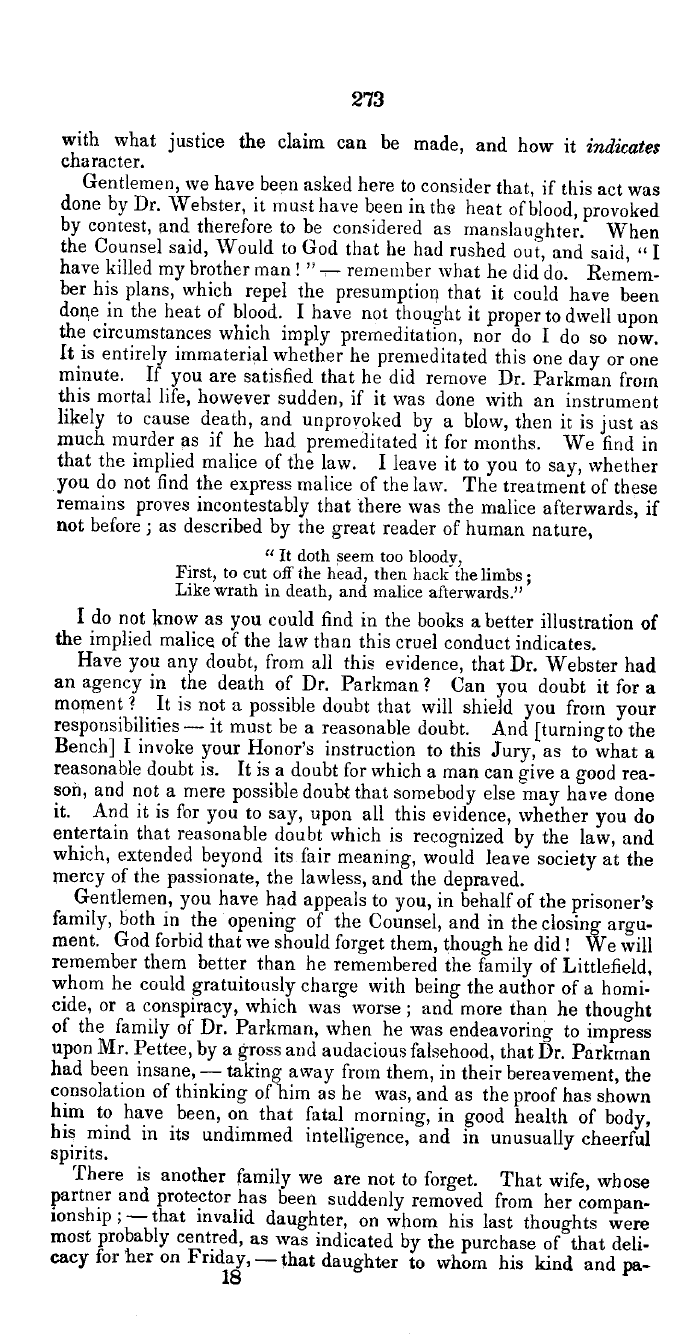|
273
with what justice the claim can be made, and how it indicates
character.
Gentlemen, we have been asked here to consider that, if this act was
done by Dr. Webster, it must have been in the heat of blood, provoked
by contest, and therefore to be considered as manslaughter. When
the Counsel said, Would to God that he had rushed out, and said, "1
have killed my brother man! " - remember what he did do. Remem-
ber his plans, which repel the presumption that it could have been
done in the heat of blood. I have not thought it proper to dwell upon
the circumstances which imply premeditation, nor do I do so now.
It is entirely immaterial whether he premeditated this one day or one
minute. If you are satisfied that he did remove Dr. Parkman from
this mortal life, however sudden, if it was done with an instrument
likely to cause death, and unprovoked by a blow, then it is just as
much murder as if he had premeditated it for months. We find in
that the implied malice of the law. I leave it to you to say, whether
you do not find the express malice of the law. The treatment of these
remains proves incontestably that there was the malice afterwards, if
not before ; as described by the great reader of human nature,
1° It doth seem too bloody,
First, to cut off the head, then hack the limbs;
Like wrath in death, and malice afterwards."
I do not know as you could find in the books abetter illustration of
the implied malice of the law than this cruel conduct indicates.
Have you any doubt, from all this evidence, that Dr. Webster had
an agency in the death of Dr. Parkman ? Can you doubt it for a
moment ? It is not a possible doubt that will shield you from your
responsibilities- it must be a reasonable doubt. And [turningto the
Bench] I invoke your Honor's instruction to this Jury, as to what a
reasonable doubt is. It is a doubt for which a man can give a good rea-
son, and not a mere possible doubt that somebody else may have done
it. And it is for you to say, upon all this evidence, whether you do
entertain that reasonable doubt which is recognized by the law, and
which, extended beyond its fair meaning, would leave society at the
mercy of the passionate, the lawless, and the depraved.
Gentlemen, you have had appeals to you, in behalf of the prisoner's
family, both in the opening of the Counsel, and in the closing argu-
ment. God forbid that we should forget them, though he did! We will
remember them better than he remembered the family of Littlefield,
whom he could gratuitously charge with being the author of a homi-
cide, or a conspiracy, which was worse; and more than he thought
of the family of Dr. Parkman, when he was endeavoring to impress
upon Mr. Pettee, by a gross and audacious falsehood, that Dr. Parkman
had been insane, - taking away from them, in their bereavement, the
consolation of thinking of `him as he was, and as the proof has shown
him to have been, on that fatal morning, in good health of body,
his mind in its undimmed intelligence, and to unusually cheerful
spirits.
There is another family we are not to forget. That wife, whose
partner and protector has been suddenly removed from her compan.
ionship ; -that invalid daughter, on whom his last thoughts were
most probably centred, as was indicated by the purchase of that deli-
cacy for her on Friday,-that daughter to whom his kind and pa-
ls
|

